|
42 (4 1881 ) Dover Road ) Dover Road
Lower Walmer
Deal
01304 366677
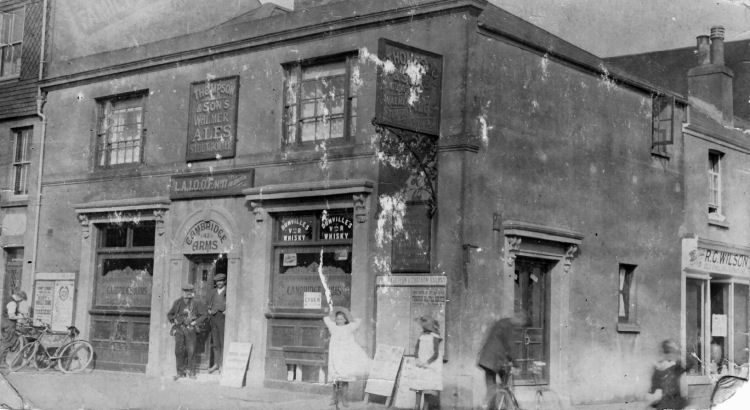 Above kindly sent to me by David Wraight, showing the "Cambridge
Arms" circa 1900. |
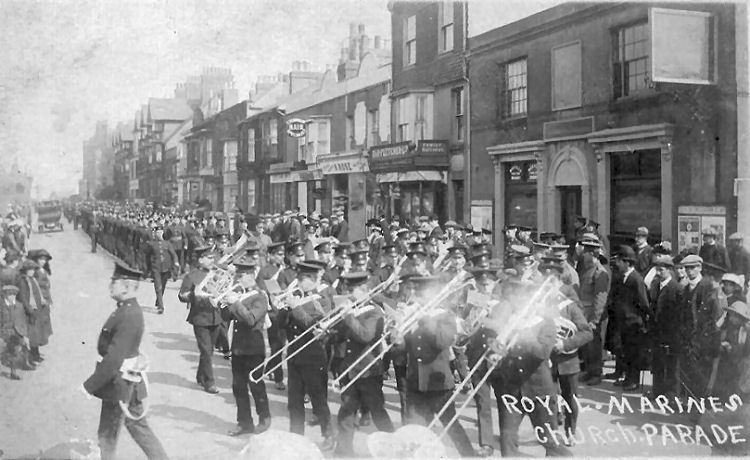
Above photo, circa 1900-30, kindly sent by Rory Kehoe. |
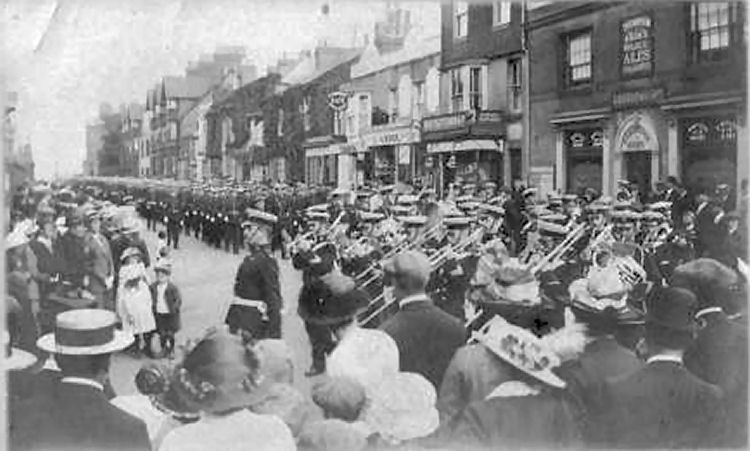
Royal Marines parading outside the "Cambridge Arms." date
some time between 1900 and 1930. |
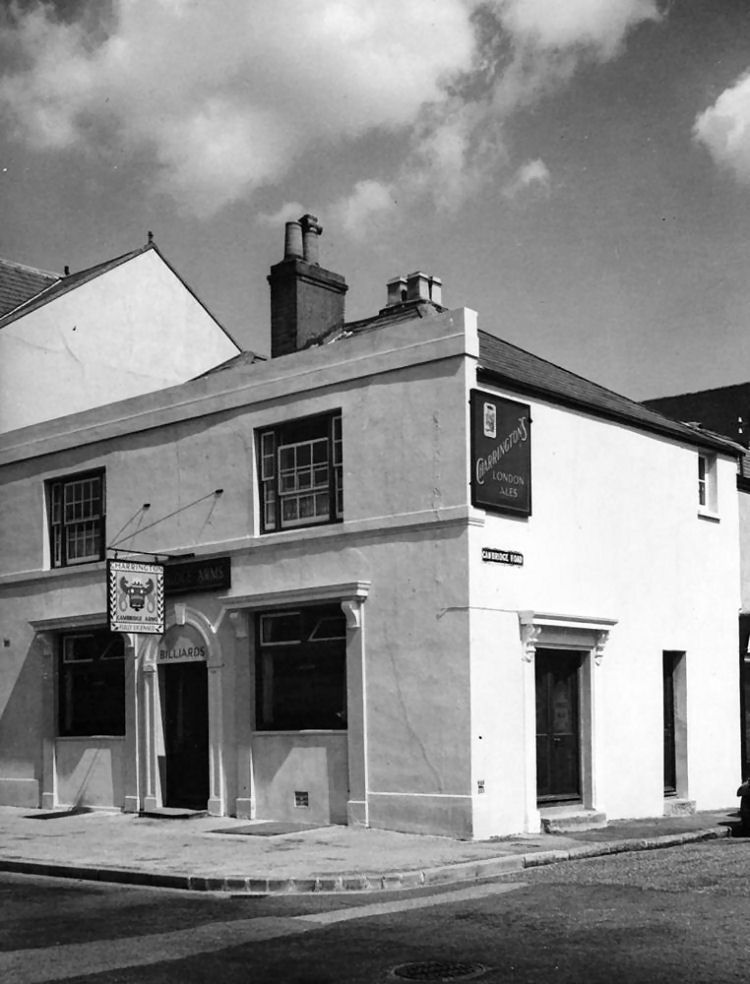
Above photograph showing the "Cambridge Arms" in 1952. |
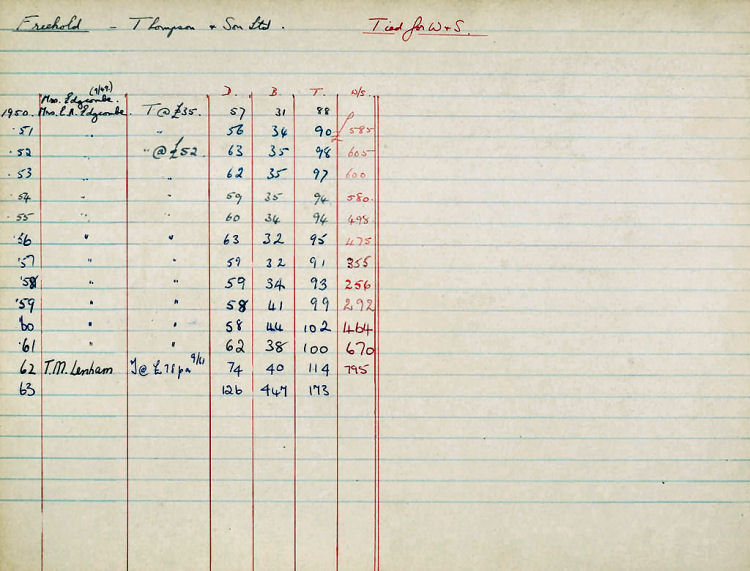
Thompson & Son ledger.
Creative Commons Licence. |
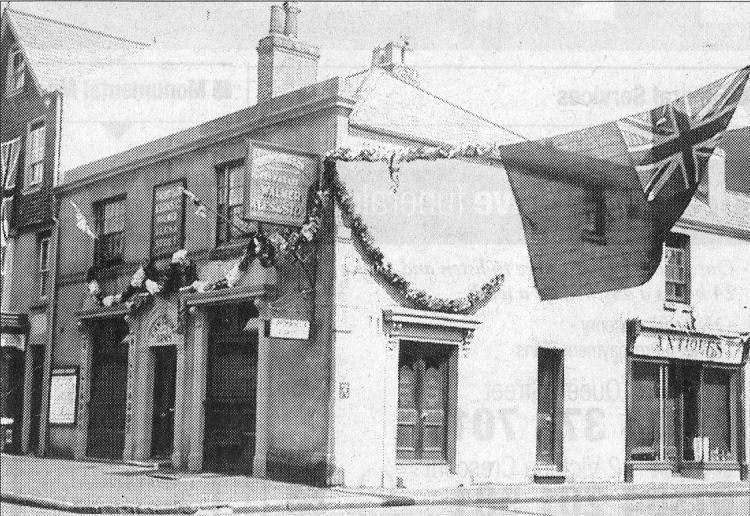
Above picture showing the Cambridge Arms when they were selling Walmer
Ales and Stout. |
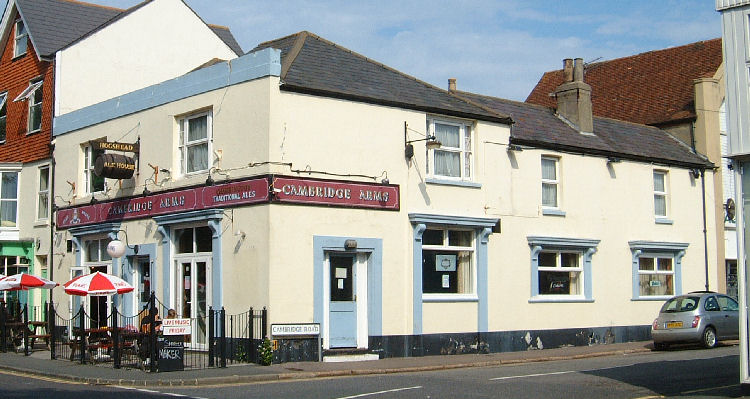
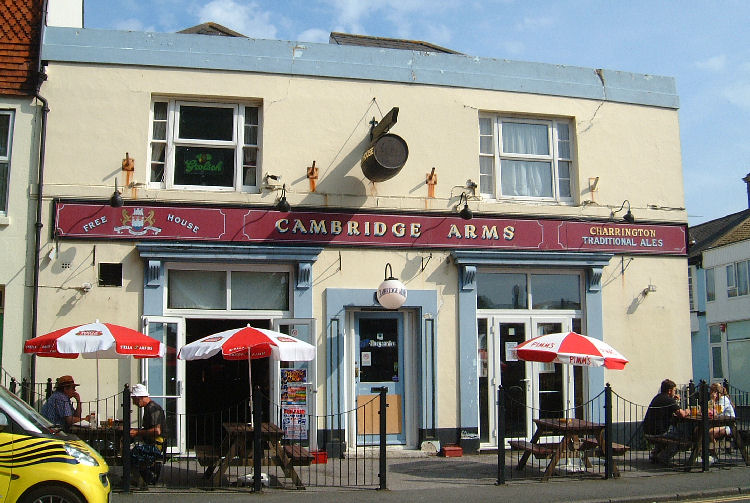
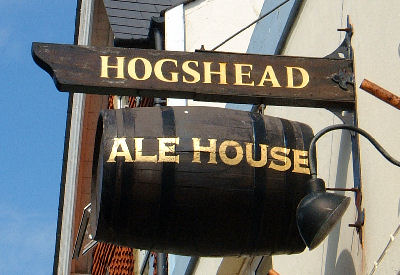
Above photos by Paul Skelton, 26 July 2008. |
Built mid 1800s and named after the first Duke, a son of George III, who
visited Walmer Castle in 1839 as guest of the Lord Warden, the Duke of
Wellington.
Changed name to the "Drum
Major" in April 1971, but now called the "Cambridge Arms" again.
I do not yet know when it reverted back but believe this was after the Royal
Marines left Deal on 26 March 1996.
|
From the Kentish Gazette, 1 December 1857.
THE LATE FATAL ACCIDENT TO AN OFFICER.
We published last week an account of the melancholy accident which
resulted in the death of Mr. R. Echalaz.
a cornet of the 7th Dragoon Guards. Further particulars have since
been gathered, but they add little of importance to what we have
already stated. On Sunday afternoon, the 22nd instant, Mr. Echalaz,
in company with three brother officers, rode from Canterbury to
Whitstable, an thence to Herne Bay. They put up at the "Pier Hotel"
where they had some refreshments, and after strolling for a while
about the town they got on their horses to return to Canterbury.
That was at six o’clock, and it was already dark. They rode at a
rapid pace through the streets of Herne Bay, breaking some of the
public lamps with their whips as they passed. Ample reparation has
since been made for the damage thus done. The deceased and another
of the party, Cornet Thomas, put their horses to speed and were soon
lost sight of by their companions. They passed through the Sweech
toll-gate without stopping to pay the toll, and without regarding,
or probably without hearing the calls of the gate-keeper to come
back. At the railway crossing at Sturry they dismounted for a moment
and then began to race together the rest of the distance.
Unfortunately the Vauxhall gate, near the barracks, was closed, and
they either did not know of its existence, or, as is more probable,
the night being dark, and the light at the gate dim, they did not
see it until to late to pull up. The evidence at the inquest, which
we subjoin, goes to shew that the deceased and his companion dashed
into the gate before they were aware, and that the horse of the
former, attempting to leap the gate, caught its fore legs on the top
bar and turned a complete somersault crushing its ride under it.
Assistance was obtained and the unfortunate gentleman was conveyed
at speedily as possible to the barracks, where several medical men
were immediately in attendance, but he remained insensible, and died
at about six o’clock on the following morning. It will be seen that
Cornet Thomas, in his examination, denies having ridden at the gate,
and also being thrown from his horse as had been represented. The
news of the sad event was speedily forwarded to the relations of the
deceased, and his father who is a clergyman of Derbyshire arrived in
Canterbury on Tuesday.
The inquest was held on Tuesday afternoon by T. T. Delasaux, Esq.,
at the "Cambridge Arms," near the barracks. The jury having been
sworn, with Mr. Murrel as foreman, and having seen the body, the
following witnesses were called:—
Robert Holness, labourer, living in Northgate, said:— On Sunday
evening last, at a few minutes before six o’clock, I was going down
to my brother’s house on the turnpike road leading from Canterbury
to Sturry. I was near the gate known by the name of the Vauxhall
Gate, when I heard some horses approaching at a very rapid pace. The
animal — a grey one — on which the deceased was seated came up
first; it attempted to clear the gate, but its fore feet struck the
top bar, and, turning a complete somersault, it fell on the
Canterbury side of the gate, crushing its rider beneath it. I went
immediately to his assistance, and having lifted off the fore leg of
the horse, dragged the deceased from under it. I then took him into
the turnpike gate house. He seemed very much hurt. His arm was
broken. I immediately sent for medical assistance. The second horse
came full tilt at the gate, struck against it, and threw the rider
over its head; he sustained no harm. Mr. Thomas Andrews very soon
attended the deceased. I assisted in carrying him to his quarters
and putting him in bed.
By a Juror:— I was enabled to see the accident perfectly, as there
was a bright lamp at the gate. The night was very dark.
William Jones Thomas, a cornet in the 2nd Dragoon Guards, who was
with the deceased on the Sunday afternoon, said - I left Canterbury
on Sunday afternoon between two and three o’clock in company with
the deceased and two other officers. We were all on horseback. We
rode to Whitstable. and from whence to Herne Bay. We left there
about six or a little after. The deceased and myself rode a little
in advance. We two galloped nearly the whole way. After we had
passed Sturry there was a race between us. My horse began to gallop,
and the deceased attempted to and did pass me. He reached the gate
before me by a few seconds. I did not see the accident, but heard
deceased cry out and the crash of the gate. My horse had not got the
better of me, but how it was with the deceased I cannot say. His
death was entirely the result of an accident. The night was dark,
but not foggy. There was a light at the turnpike gate, but not so
bright as to be seen at more than five yards distant. The deceased
had had a glass of beer and three small glasses of brandy; but he
was not by any means intoxicated. He rode steadily, and had perfect
command of his horse. I believe the accident arose from the
deceased’s horse going at such a rate that it was unable to stop
when it was near the gate; it attempted to leap it, and failed. The
deceased alone induced the animal to keep up so rapid a gallop. I
did not ride at the gate at all, as the last witness stated; neither
was I thrown from my horse. We had nothing to drink at Sturry.
By a Juror:— We did not jump any other turnpike-gate on our way from
Herne Bay.
Richard Tookey, an engine driver, now living at Canterbury, said:- I
was at Sturry on Sunday evening, at about half-past six, and saw two
gentlemen riding down Sturry-street-hill at a very rapid rate. One
was on a grey horse. They stopped just us they reached the
railway-crossing and dismounted, calling at the same time to some
boys to hold their horses. One of the animals was restive—the bay
one—and I stepped up and held it. The gentleman who rode the bay
horse appeared as though he had had too much liquor; he could not
get his foot in the stirrup, and I had to assist him up. He said "We
will not go so fast again to-night." One of them said to me, "Good
night old fellow; I’ll give you something to-morrow." They then
passed through the village at a walk; but when out of it I heard the
horses first trotting and then galloping. I was walking along the
road myself, and arrived at the gate the moment when men were
carrying the deceased into the house.
Mr. T. Andrews, surgeon, said:— I was sent for at about seven
o'clock on Sunday evening to attend the deceased. He was then being
conveyed to the barracks on a stretcher. I attended him there and
examined him, and found that his left arm was severely fractured; he
was insensibly and in strong convulsions. We have not made a post
mortem examination, but presume that the severe fall he sustained
caused such injury to the brain as to produce death. There can be no
doubt that the brain was concussed. I remained with him from seven
o’clock till three o’clock in the morning, and then left him in
charge of another medical attendant. He died at about six o'clock
the same morning. The injuries he sustained might have been caused
by such an accident as has been described.
In answer to a juror, the witness said that I was the opinion of
himself and four other medical men that the brain was lacerated.
The coroner then summed up, and said that all must deplore the
melancholy accident into which they had been that day enquiring, and
through which a young man had been suddenly and prematurely thrown
into eternity. The jury, however, had only one duty to perform, and
it was not difficult: they had to say, upon the evidence whether the
occurrence was accidental or not. For his own part he thought that
no doubt could be felt on that point. There had been nothing
produced to prove that the deceased was in a state of intoxication
at the time of the occurrence, and he hoped that it would not go
forth to the world that there was any ground for supposing him to
have been intoxicated. The deceased and his companion had evidently
been riding at a very rapid rate the whole way from Herne Bay; and
supposing any accident to have occurred to another party they might
have been placed in a very awkward position. With this, however, the
jury were not concerned. It was for them merely to say what was the
cause of death, and what led to that cause. That the cause was
concussion of the brain, and that that was produced by an accident,
could hardly he thought be doubted by any one.
The jury immediately returned a verdict of "Accidental death,"
adding that in their opinion the light shown at the turnpike gate
was not sufficiently bright. Had it been more brilliant, the jury
thought the accident would not have happened.
|
|
From the Dover Express and East Kent News, Friday,
23 July, 1869.
FATAL ACCIDENT AT DOVER
We regret to announce that a fatal carriage accident occurred at
Castle Hill, last night, which had had a fatal termination, the life of
a lady who was on a brief visit to Dover from Brighton having been
sacrificed. From the particulars we have been able to glean it appeared
that the lady in question, the wife of a gentleman named Clark,
yesterday came to Dover from Brighton for the day, in company with her
lady friend. They were met at the South-Eastern Railway station by a
gentleman named Brooksby, a connection of one of the ladies, whom drove
over from Walmer in a carriage he had hired for the purpose. the
vehicle belonging to Mr. Barnes, livery stable keeper, of the "Cambridge
Arms," Lower Walmer, and was driven by a man in his employ. It appeared
that after the ladies had arrived at Dover they expressed a desire to
visit St. Margaret's at Cliff, and the fly was driven to that village;
and it was while the party were returning to Dover that the accident
occurred. From what is stated it seems that the driver of the fly, on
descending the Castle Hill, neglected to put on the skid-pan, and it is
supposed that in the course of the descent the dashing-board touched
the horse's hind quarters, for the animal started off at a rapid pace.
Mrs. Clark, alarmed at the velocity of the vehicle, stood up in the
carriage, and before the gentleman could prevent her, leaped out and
fell upon the roadside. The other lady was about to follow, when Mr.
Brooksby prevailed upon her to retain her sea, and himself jumped out to
Mrs. Clark's assistance. Mr. F. Packham, jun., being on the hill, and
hearing a noise, ran to see what was the matter, and found the horse
galloping down the road. With great daring and presence of mind he
seized hold of its head, and stopped the carriage in half a minute,
after Mr. Brooksby had jumped from it. Mrs. Clark was found unconscious,
though without external injuries, and she was conveyed at once to the "Imperial
Hotel," where she was attended to by Dr. Parsons. Notwithstanding
the most unremitting attention, however, the unfortunate lady expired at
an early hour of this morning. The friends of the deceased lady, who is
said to have left two young children, have been communicated with, and
an enquiry into the circumstances of the unfortunate occurrence will be
opened by the Borough Coroner, W. H. Payn, Esq., this evening.
(Click here).
We are required to state that the horse and harness employed at the
time of the accident were not the property of Mr. Barnes, but had been
hired in Dover, for the journey to St. Margaret's, while the horse which
had drawn the carriage from Dover was put up at stables, in order to be
in readiness to convey Mr. Brooksby to Walmer again in the evening.
|
|
From the Deal, Walmer, and Sandwich Mercury,
6 January, 1900. 1d.
THE INQUEST
On the body of the chief diver, Leopold Christian Helfricht, was held
before Dr. Hardman, Coroner, at the "Cambridge Arms," Walmer, on Friday
afternoon, when the following were sworn on the Jury: Messrs T. Nash
(foreman), J. P. Ansell, H. L. Simmons, W. D. Bushell, H. V. Rose, G. A.
Cobb, F. J. Thompson, George Dickins, James Christy, R. A. Wilson, John
W. G. Miller, John Mercer, and K. Kingsnorth.
The Jury having viewed the body, Dr. John Wood, Walmer, deposed that
he went off to the tug to see the deceased, about 12.30 on Thursday. He
was not, in his opinion, alive, and certainly not later on, after his
having tried artificial respiration, which was also being applied at the
time he arrived. Witness made efforts to restore life for about half an
hour, without success. He gave his whole attention to the deceased.
Everything possible was done to restore animation. The cause of death
was drowning.
Bronke Garrels, captain of the tug Albatross, stated that he knew the
deceased, who was 25 years of age. He was a diver, a German subject.
Deceased was standing till the last on the deck of the Patrie.
The witness was unable to understand the questions, and the next
witness was called.
Fritz Spruth said he was in charge of the salvage operations, on
behalf of the Northern Salvage Company, of Hamburg, and the whole of the
men were under his control. He had been at work for several weeks, and
on Thursday the steamship was moved, after the preparation was
completed. Witness was sent here to salve the ship, and when he judged
it proper, he made an attempt to move her. He came alongside the ship at
five o'clock in the morning, and the tugs were alongside, using their
pumps. The Seeadler was posted at the fore part of the ship, to pull the
ship ashore. It was then about nine o'clock. It was his intention to
pull the ship further ashore, opposite to where she was lying. It did
not strike witness that it was an operation that was perhaps dangerous.
There were about seven men forward, as far as he could see, engineers
and fireman working the four portable pumps. He suspended pumping
operations while the ship was moving. The boilers of the Svitzer were
only working the portable pumps on board. They had a boat alongside,
with men in it. They always, whenever they did this work, had a boat
alongside, to take the men off if necessary. They wanted about six men
to attend the lines that were out, to keep the ship towards the shore.
the boilers were on the bridge deck. From the time the vessel moved till
she went down was not more than ten minutes. Witness remained on the
funnel about an hour. He never saw the boat again. He saw several men in
the water. He did not see the deceased in particular. There were two
German and two Danish divers. Neither were doing any work. There were in
their diving dresses except a helmet and the leads. Two had been working
inside the ship, but two hours before. They were all on deck when the
vessel sank. While they were pumping, the divers now and then had to go
below to remove the grain from the pumps to prevent their getting
choked, and he had sent the deceased down into the engine room to look
after the water there previously, but he was on deck at the time of the
accident. Divers had to stand by to shift the hose. They were obliged to
have some men on board to attend to the lines that were attached to pull
the vessel ashore. The portable boilers were placed on the bridge. They
were aground up to the very minute while towing, and immediately after
she was off, the stern-rope was broken, and the vessel sank. Witness was
on the bridge of the Patria amidship. They had two tugs working fore and
aft, and one amidships. They were bound to work on the flood tide, and
the tide took the vessel at once into deep water. When the ship was
aground, there were a lot of the crew in the fore-part of the ship, and
as soon as she was swept off the ground, she took the tug with her, and
commenced to settle a little, but not much. He thought, however, he
would be able to tow the vessel ashore again stern on. He soon found
that he could not control her, and called the men away from the forepart
of the ship, and they jumped over into the boat that was tied alongside
at the fore-part of the ship. He did not know then that she was going
down, but finally he noticed that she went down within a couple of
minutes. He sang out for the boat to keep away from the ship. He did not
see whether deceased got into boat. He had himself to jump for his life,
as the water came up so quick. He thought he had a very safe place on
the bridge, but the water came up so high, that he had to jump, and run
up to the top of the iron ladder on the funnel. There was no steam on
board the vessel. Two portable pumps were worked by the Svitzer, and one
each by the Seeadler and Albertross; but the two latter were
disconnected when they began to tow. He could not saw what became of any
of the men he saw in the water. A Deal boat took him off. He was there
an hour, because they could not get him off. The tide was rushing over
the ship, and he could not get down the ladder. He saw no one picked up,
as he was on the fore part of the funnel, and the men were all aft. The
Svitzer was alongside, but they could not get at him.
Thos Withers said he was an officer employed by the Trinity Service
to look after the cargo during the time they were working to raise the
ship, and bringing her to.
The Coroner: What have the trinity to do with the cargo? I can
understand they have some object in seeing the wreck cleared from the
fairway.
Witness did not know their object. He had been on board five weeks,
and was on the Patria when she went down. He was seeing that none of the
cargo was touched during the time they were salving the ship.
The Coroner: But where does the Receiver of Wreck come in, if the
Trinity services look after the cargo?
Witness could not say. He knew they were going to move the steamship,
and did not consider there was any danger when they first went off. He
was walking the bridge when she moved. She did not settle down when she
first came off. One tug pulled at the bow, and the other at the stern,
to try and get her end on to the tide, and they got her too far, when
the tide caught the starboard bow, and she paid her head right round.
The Seeadler tried to pull her towards the shore, but could not hold
her, and the ship went away, tug an all. The tug was absolutely useless
then. Two tugs could not have held her - he did not know about three.
Captain Spruth had full jurisdiction over the work. When once the tide
took the bow they could not stop her, and she settled down forward and
grounded, the water aft rushing forward and keeping her down. He heard
captain Spruth shout to the men to get away from forward, and there was
no one forward at the time. They all cleared away because she was
filling when she went down forward. He then heard an explosion, as if
something had burst with the rush of water coming in forward, and no
sooner had he heard it than the vessel went down. He ran and jumped on
board the tug lying alongside, and just got over the rail as the boilers
became submerged. He believed that either some of the buklkheads burst,
or something gave way in the vessel's bottom in the engine-room because
she went down all of a sudden. There was no time for anything after she
begun to fill forward. He saw four or five men in the water. The tug
that was pumping was made fast alongside, and the Seeadler had to tow
her away clear of the wreck. The tide was setting them on top of the
vessel. The crew cut the stern ropes, but kept her fast forward, or she
must have gone right on top of the wreck. The boatmen and crews got into
the boats, and picked up all they could. Three or four were picked up by
one boat. If they had not cropped away the stern ropes, the tug would
have gone down. The vessel had been lying across the tide, and they
could only work three-quarter tide, and they wanted to get her end on,
so that they could lay alongside at any time. He did not think Capt.
Spruth ought to have had more tugs on. He did not think the tide would
catch the vessel on the starboard bow. He did not intend her to pay off,
and catch the flood tide. He thought one tug at the stern and one at the
bow would be sufficient, but her head went too far off. There was need
for pumping after the ship was moving, as the water was coming in all
the time.
The Coroner: Then was it a practical certainty that she would sink if
in deep water.
Witness: The pumps pumped a great deal more out than would come into
the ship.
|
|
From an email received 6 April 2020. Some considerable time ago
my mother wrote a family history, garnered almost exclusively from the
memories of her mother and other relations, in which she recorded the
following information.
"Albert Ashby (1862-1903) Albert’s marriage was an unhappy one. His
wife, Jenny, was very wayward and pleasure seeking. They went to
Australia as did (his brother) William and seemed to fare better. When
they returned to Britain they were able to buy a public house in Deal
called "The Lord Walmer". Jenny passionately loved dancing and it is
alleged she gave very generous change to her friends and relations so
causing the business to run at a loss. She often went dancing without
her husband and one night he forbade her to go out, but she defied him
and when he had locked up he went out and lay on the beach. His body was
picked up the next morning. His wife and daughter left hastily with all
available money, insurance policies and grave papers and no one was able
to trace them. Albert was buried in Deal in 1903 at the age of
forty-two."
Emma Ashley (great grandniece of Albert Ashby).
P.S., There are both Ashby's and Ashley's in my family tree - my
great grandparents are to blame!
(Some of the above recollections are
slightly out, Albert Ashby actually first had the "Crispin"
in Deal and died in 1905.)
|
|
From the Dover Mercury, Thursday 22 April, 2010.
PUB ONCE HELD A MUSIC HALL LICENCE.
By Steve Glover and Michael Rogers.
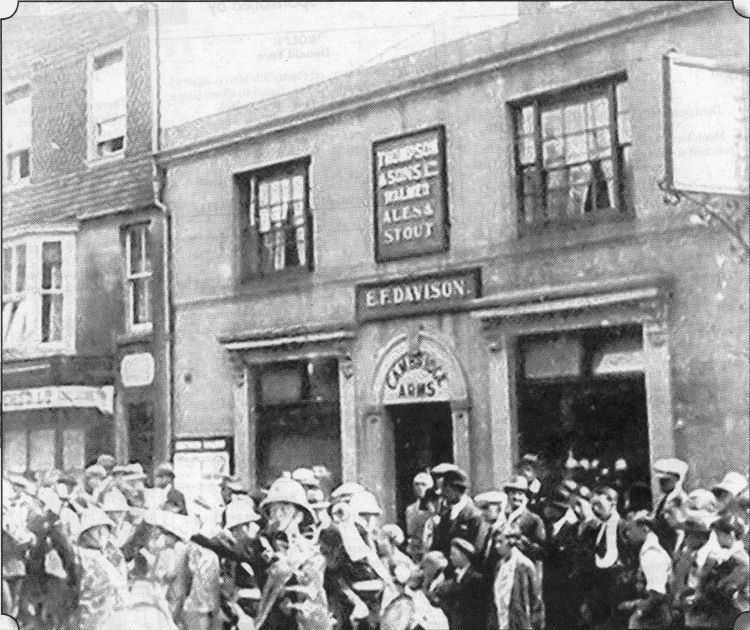
Above photo shows the Royal Marines march from the seafront into the
barracks in 1952.
THE Cambridge Arms, in Dover Road, Walmer, apparently dates back to
the early 1800s.
But the first documentary evidence of the building being used as
licensed premises appeared in 1840 when Mr. E. T. S. Reader took a
63-year lease from the Leith Estate and ran it as a pub, before moving
on to manage other public houses in the area.
The first mention of the pub by name came in 1858 when George Barnes,
a Grocer and Cheesemonger by trade, became landlord of the Cambridge
Arms.
The pub held a music hall licence and in 1861 singer, Harry Levy
performed there. In May 1892, a fire broke out on the premises early one
morning, resulting in the destruction of the building and damage to
neighbouring properties.
With great irony perhaps, it was announced that, shortly after the
pub had been rebuilt on the same site, smoking concerts were to be held
there every Saturday.
In 1905, landlord Albert Ashby was found drowned in the sea, but no
evidence could be offered at the inquest as to the circumstances
surrounding his death.
The pub changed its name in April 1971 to the "Drum
Major" and Bass Charrington's local artist Bill Pierce painted Drum
Major Charles Bowden for the new sign.
In 1978, Kent cricketer Alan Ealham unveiled the pub's new
first-floor restaurant and, in 1981, "27 year old proprietor" Ian
Dunkerley (now owner of Dunkerley's restaurant) took over and advertised
it as Walmer's Finer Diner.
Diane Tyrell was installed as new manager of the Cambridge Room
restaurant in 1982 when it was re-opened by former Indian Test cricketer
Dr Carl P Maras.
The Cambridge Arms reverted to its original name around 1994. It
remains open to this day and is a popular live music venue, although its
restaurant closed some time ago.
Do you think she was ready to be moved?
Yes. The divers had been round nearly a fortnight before, and since
the gale they had surveyed the bottom of the ship.
A Juror: They could not see the bottom?
Not right on the ground. She was lying flat on the ground. The divers
could not know what damage was done to the portion they could not get
at.
Do you think it was something gave way in her bottom, that had been
plugged, that caused her to go down so quickly?
No. As soon as I heard that explosion, I ran down and made a jump,
and was no sooner on the tug, than the ship was under water.
Capt. Spruth, re-called, said he had been watching the tides for the
last six weeks, and understood them. After long years as captain of a
ship he could ascertain the force of the tide by observation. He did not
know exactly, but it was almost four knots of speed at full tide. For a
fortnight he had talked it over with an experienced pilot, Mr. Pearson,
but he had nobody on board with him at the time to consult. The vessel
was aground all the time, but perhaps came too far off with here stern
and slipped off the ground, when the tide took her and she sank. He had
a lead down forward, and she did not move off the ground till then. It
was necessary for the third tug to be pumping while the ship was being
moved. The two tugs were sufficiently powerful to hold the ship on the
flood as soon as they had water enough under her bottom, but with the
vessel only a couple of feet from the ground, no power in this world
would have held this size ship. From his experience, she would have
swept along with a dozen tugs, and the fore-part was higher then the
after-part. The fore-part was filled with cargo, and they were pumping
the after-part out, so that that portion came up. As soon as she had a
little move in her, they took her round head to the stream, and tried to
get her that way. They did not try to move her, entirely, but to keep
her there until the water fell and left her there, and when in that
position, they would have removed the cargo from the fore-hold, and
pumped again. As soon as they had got her a little over the current. it
took off the starboard bow, and she went off the ground, slipped off
gradually, and went along with only the tug on the bow to hold her. His
idea was to keep the ship up to the bank as far as possible, but the
tide took hold of her, and swept her away. they wanted to run the vessel
ashore stern forward to pump her out, and get at the grain and maize she
had in the hold, and again plug her.
The Coroner: What can you do with her?
Witness; I am afraid she is lost now. She is in deep water, with
water on top of the buklwarks, and I don't think there is any means of
saving her.
In reply to further questions, witness said he had been engaged in
salvage operations some years, and employed by a large salvage company
engaged by large insurance companies. He did the best he could according
to his experience. He did not think there was considerable risk to this
tug, for as soon as she cut her lines she was clear of the wreck. He did
not expect the vessel would sink so deep, and remained on the bridge
deck till the water came up to the bridge. He did not think she was far
enough into deep water to allow the ship to sink so low. He thought the
strength of the current might very likely cause the ship to go as she
did, and he considered he took all the precautions that could have been
taken to prevent it. the tug he had on the stern parted its rope in
bearing round to tow the stern of the ship off the shore with the ship
against the tide. For a while he had no tug to tow, and the other pulled
astern to pull the vessel on shore again. They did not work with double
cables. there was always a risk of one of them parting cable, but they
were very seldom parted their heavy cables. These were the most powerful
tugs from Hamburg.
The Coroner said the Jury were called to decide by what means this
man, who was a diver, employed in the salvage operations, met his death.
The case, as presented to them primarily, was one of accidental death,
and unless they were satisfied that there was culpable negligence, which
would amount manslaughter on the part of some person responsible for the
operations, it would be their duty to return a verdict of accidental
death. the operations, as they knew, were under the command of Captain
Spruth, and it appeared that he was employed by a large German salvage
firm, and that he had had considerable experience in salvage operations
for some time. He had been in charge for a number of weeks. He told them
he had carefully studied the tides during that time, and taken the
counsel of pilots and others, as to the strength of the tide, and the
time for the operation and so on. Captain Spruth was assisted by divers
and by tugs, which, as he told them, were all of a powerful description,
and well fitted for the work. The preparations were made, apparently
with care, and the whole thing went wrong at the last moment through the
causes that had been explained. It had been stated in the dailies that
the boat alongside was fouled by the rigging of the ship in going down,
but there was no evidence of it before them. Captain Spruth was behind
the funnel, and could see very little that occurred, at the moment of
the sinking of the steamship, and Mr. Withers, who gave valuable
evidence, did not seem to have noticed that. They had heard the
Captain's explanation as to how the accident occurred. It was for them
to determine whether there was any carelessness on the part of Captain
Spruth, if it was to effect their verdict, of a very gross description,
such as to amount to responsibility for the life of this man. He was
bound to tell them he was unable to discover any carelessness of this
sort. He did not profess to be able to say whether every possible
precautions was used, but it seemed to him they could tell from the way
in which the evidences were given that there was no gross neglect or
anything that would bring the captain within the reach of the criminal
law. He was a skilled man, and there was nothing to show that he did not
exercise his skill in the proper way, or that the accident was
avoidable. They were not there to decide whether Captain Spruth used
every possible means within his power. The only question before them was
whether he was so grossly careless as to become criminally responsible.
On that he did not think they would have any difficulty. He did not wish
his words to imply there was any want of due precaution on the part of
the captain at all. He did not hesitate to say he had not discovered
any, but he was bound to make clear to them the legal position that
effected their verdict. If they agreed with the view he took their
verdict would be one of accidental death. At the same time, if they
wished to express an opinion by way of a rider, or add anything by which
a loss of life of a similar character could be avoided, they were at
liberty to make and representation.
A verdict of accidental death was returned.
We understand that Jack Adams, one of the survivors, has, since his
emersion, been seriously ill.
|
Unfortunately this is another pub that closed in March 2013 and is
currently for sale.
|
From the Dover Mercury, 14 March, 2013. 80p.
ARMS' FIRST LANDLORD WAS A CHEESEMONGER
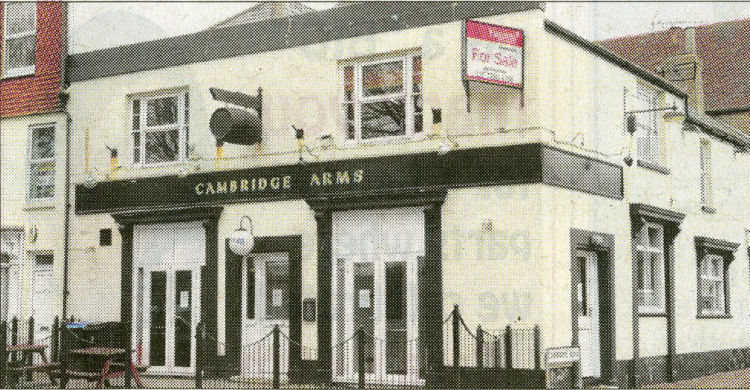
FOR Sale signs are now up out another Deal pub with the closure of
The "Cambridge Arms" in Dover Road, opposite the Jubilee Gates of the
former Royal Marine barracks.
According to The Pubs of Deal and Walmer (with Kingsdown and Mongeham)
the original pub dates back to the early 1800s and in 1858 George
Barnes, a grocer and cheesemonger by trade, became landlord. The comer
building in those days had a music hall licence and in 1861 singer Harry
Levy, described as a ‘Buffalo singer' gave a performance.
But disaster struck in May 1892 when fire broke out on the premises
early one morning and the building was destroyed, with neighbouring
properties also damaged.
With great irony perhaps it was announced that, shortly after the pub
had been rebuilt on the same site, smoking concerts were to be held
there every Saturday.
In April 1971 The "Cambridge Arms" name was changed to the "Drum
Major" and Bass Charrington's local artist Bill Pierce painted Drum
Major Charles Bowden, formerly of Deal, for the new sign.
In 1978 Kent cricketer Alan Ealham unveiled the pub's new first-floor
restaurant and it was run by Ian Dunkerley, now owner of "Dunkerley's
Hotel" and Restaurant, Beach Street, Deal.
He said: “I called it The Cambridge Room and we had a full French
menu, written in French, which was probably a bit ahead of its time!
“I had a couple of good years there, made a living and the business
taught me how to be careful with money. It was a good learning curve for
me.”
The pub reverted to its original name about 1994 and became a music
venue. Benches were placed outside facing Dover Road, with fencing too.
Two front windows were converted to doors. |
Just heard that it has reopened again at the start of June 2013, and
reverted back to the "Drum Major"
again.
LICENSEE LIST
READER Mr E T S 1800s+

VERRIER Benjamin 1841+

STEPHENSON Mr 1851+

BARNES George 1858-71+ (also grocer and cheesemonger age 67 in 1871 ) )

BARNES Thomas 1874-82+
 (Fly proprietor
(Fly proprietor
 ) (age
46 in 1881 ) (age
46 in 1881 ) )

SUTTON Thomas 1891+ (age 61 in 1891 ) )
ROBERTSON Charles William 1891+

GODFREY Mrs to May/1892 (fire broke out destroying the building
 ) )
Rebuilt by November 1894
CORBISHLY Thomas 1899-03+
 
 ASHBY Albert 1905+
ASHBY Albert 1905+

 WRAIGHT Henry N 1910-14+
WRAIGHT Henry N 1910-14+
 
DAVISON Edward Fletcher 1915-32+
   
SPOONER James Spooner 1934-38+
 
EDGECOMBE Mr R S 1948-49 Dec'd

EDGECOMBE Edith 1949-55+

LENHAM Tom M 1962-66+

STEVENS Peter & BOLDER Clarence 1970 ( Ex Marines)
Ex Marines)
Changed name to the "Drum Major"
https://pubwiki.co.uk/CambridgeArms.shtml
JOHNSON Brian & DEVERILL Kevin Feb 1995

LEACH Paul 1995

LEACH Paul & BAKER Richard 1998

KENP John May 2000

KEMP John & JONES Angela July 2000

BRAMHALL Charles & Sharon 2002+

ROBERTS Colin to Sept/2011
WILSON Dave Sept/2011-Jan/2013
 From Melville's Directory 1858 From Melville's Directory 1858
 From the Post Office Directory 1874 From the Post Office Directory 1874
 From the Post Office Directory 1882 From the Post Office Directory 1882
 From
the Kelly's Directory 1899 From
the Kelly's Directory 1899
 From the Kelly's Directory 1903 From the Kelly's Directory 1903
 From the Post Office Directory 1913 From the Post Office Directory 1913
 Deal Library List 1914 Deal Library List 1914
 From the Post Office Directory 1918 From the Post Office Directory 1918
 From the Post Office Directory 1922 From the Post Office Directory 1922
 From the Post Office Directory 1930 From the Post Office Directory 1930
 From
the Kelly's Directory 1934 From
the Kelly's Directory 1934
 From the Post Office Directory 1938 From the Post Office Directory 1938
 The Old Pubs of Deal and Walmer by Glover and Rogers The Old Pubs of Deal and Walmer by Glover and Rogers
|










